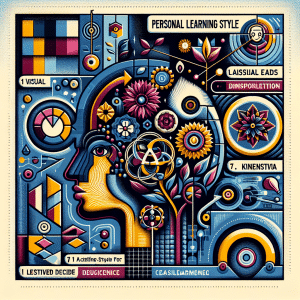
Welcome to the Accelerated Learning Strategies and Techniques Lesson!
Introduction
Welcome high school and college students! In this self-guided online lesson, we will delve into the world of accelerated learning strategies and techniques. Whether you are aiming to improve your study habits, enhance your memory retention, or simply learn how to learn more effectively, this lesson is designed to equip you with the tools and knowledge to reach your academic goals efficiently.
Accelerated learning is a powerful approach that focuses on maximizing the efficiency of the learning process. By utilizing specific strategies and techniques, you can significantly enhance your ability to absorb and retain information, ultimately saving you time and effort in your educational journey. This lesson will introduce you to proven methods that can help you accelerate your learning and achieve success in your studies.
Throughout this lesson, you will discover practical solutions and actionable tips that you can implement immediately to enhance your learning experience. Whether you are preparing for exams, working on a research project, or simply looking to expand your knowledge, the strategies and techniques covered in this lesson will empower you to become a more efficient and effective learner.
Accelerated learning strategies are powerful tools that can help high school and college students reach their academic goals more efficiently and effectively. By utilizing these strategies, students can enhance their learning experience, improve their retention of information, and ultimately achieve success in their studies.
One key aspect of accelerated learning is understanding how the brain processes and retains information. By leveraging techniques that align with the brain's natural learning processes, students can optimize their learning potential. This includes techniques such as active learning, visualization, and creating meaningful connections between concepts.
Another important component of accelerated learning strategies is effective time management. By prioritizing tasks, setting clear goals, and utilizing techniques like the Pomodoro technique for focused work periods, students can make the most of their study time and avoid procrastination.
In this lesson, we will explore a variety of accelerated learning strategies and techniques that can help high school and college students improve their study habits, enhance their understanding of complex topics, and ultimately achieve academic success. By incorporating these strategies into your daily routine, you can unlock your full learning potential and excel in your studies.
Understanding Different Learning Styles is essential for high school and college students looking to accelerate their learning process. Individuals have unique ways of processing information, and recognizing your preferred learning style can significantly enhance your study techniques and academic performance.
There are three primary learning styles: Visual, Auditory, and Kinesthetic. Visual learners grasp information best through visual aids such as charts, diagrams, and videos. If you are a visual learner, incorporating colorful visuals and mind maps into your study routine can help you retain information more effectively.
Auditory learners learn best through listening. If you are an auditory learner, consider recording lectures, reading notes out loud, or engaging in group discussions to reinforce your understanding of the material.
Kinesthetic learners prefer hands-on experiences. If you are a kinesthetic learner, try incorporating physical activities into your study sessions, like role-playing scenarios, conducting experiments, or using flashcards for interactive learning.
Understanding your dominant learning style and incorporating strategies that align with it can make studying more engaging and effective. Experiment with different study techniques to determine which methods work best for you based on your unique learning preferences.
Effective note-taking is a crucial skill for high school and college students aiming to achieve their academic goals. By implementing proper note-taking techniques, you can enhance your learning experience and improve your retention of important information. Here are some strategies to help you take effective notes:
1. Stay Organized: Use a structured format for your notes, such as bullet points, outlines, or mind maps. This will make it easier to review and study your notes later on.
2. Active Listening: Focus on listening actively during lectures or study sessions. Take notes on key points, important details, and anything the instructor emphasizes.
3. Use Keywords and Abbreviations: Develop a system of keywords and abbreviations to speed up your note-taking process. This will help you capture essential information quickly.
4. Review and Revise: Regularly review and revise your notes to reinforce your understanding of the material. This will also help you identify any gaps in your knowledge.
5. Summarize and Reflect: After taking notes, summarize the main points in your own words. Reflect on the material to deepen your understanding and make connections between different concepts.
By incorporating these effective note-taking techniques into your study routine, you can optimize your learning process and achieve your academic goals more efficiently.
Memory improvement is essential for academic success. Here are some effective memory improvement exercises that high school and college students can incorporate into their study routines:
1. Visualization Techniques: Visualizing information can make it easier to remember. Try creating mental images or visual diagrams of the material you are studying.
2. Mnemonics: Mnemonic devices are memory aids that help you remember information by associating it with something more familiar. Create acronyms, rhymes, or visual images to help recall complex concepts.
3. Chunking: Break down large amounts of information into smaller, manageable chunks. This technique can help improve retention and make it easier to recall details.
4. Repetition and Review: Regularly reviewing and repeating the material you are trying to remember can strengthen your memory. Consider using spaced repetition techniques to optimize this process.
5. Mindfulness and Focus: Practice mindfulness and focus techniques to improve concentration and reduce distractions. Being fully present while studying can enhance memory retention.
By incorporating these memory improvement exercises into your study routine, you can enhance your ability to retain and recall information effectively.
One of the key components of successful accelerated learning is effective time management. By efficiently managing your time, you can maximize your learning potential and achieve your academic goals. Here are some strategies to help you improve your time management skills for efficient learning:
1. Create a study schedule: Develop a weekly study schedule that includes dedicated time for each subject or task. By planning ahead, you can ensure that you allocate sufficient time to cover all your coursework and assignments.
2. Prioritize tasks: Identify the most important and urgent tasks on your to-do list and prioritize them accordingly. This will help you focus on completing essential assignments first and avoid feeling overwhelmed by the workload.
3. Avoid multitasking: While it may seem efficient to juggle multiple tasks at once, multitasking can actually decrease your productivity and learning effectiveness. Instead, focus on one task at a time to give it your full attention and produce higher-quality work.
4. Set specific goals: Establish clear and achievable goals for each study session. By setting specific objectives, you can stay motivated and track your progress, leading to a more productive learning experience.
5. Take breaks: Remember to incorporate short breaks into your study sessions to prevent burnout and maintain focus. Taking regular breaks can help you recharge your energy levels and improve your overall concentration.
6. Eliminate distractions: Identify potential distractions in your study environment, such as social media, and take steps to minimize or eliminate them. Creating a distraction-free space will enhance your ability to concentrate and learn efficiently.
7. Review and adjust: Regularly review your study schedule and time management strategies to identify areas for improvement. Be flexible and willing to adjust your approach as needed to optimize your learning process.
By implementing these time management strategies, you can enhance your efficiency and effectiveness as a student, ultimately helping you achieve your academic goals through accelerated learning.
Keep Striving for Your Academic Success
Remember the Importance of Developing Effective Learning Strategies
As high school and college students, your academic success is crucial for your future endeavors. By focusing on developing effective learning strategies, you are setting yourself up for achievement and growth in your educational journey. Goal9 emphasizes the significance of honing these strategies to enhance your learning experience.
If you feel the need to revisit the concepts covered in this lesson, don't hesitate to review the material. Additionally, make use of the other lessons in the course to further expand your knowledge and skills in accelerated learning techniques. Remember, continuous improvement is key to reaching your goals and excelling in your academic pursuits.
